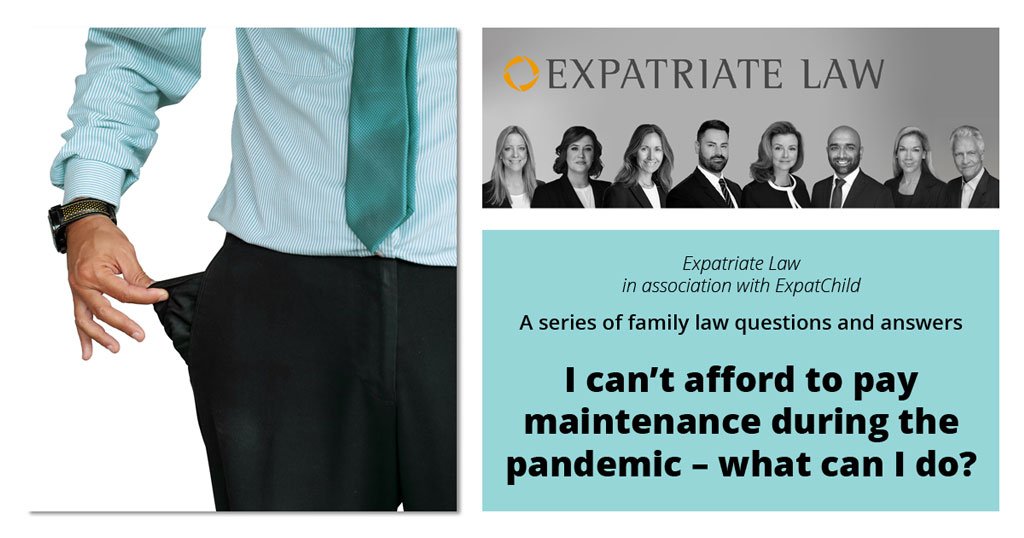
This was originally posted on the ExpatChild Facebook page on 24th April 2020, and further on social media. You can view the original here.
I can’t afford to pay maintenance during the pandemic – what can I do?
As the coronavirus pandemic continues to affect our lives in ways that previously seemed unthinkable, individuals who have had their livelihoods affected may now find themselves unable to meet previously fulfillable economic obligations.
If you currently pay child or spousal maintenance and find yourself in a situation where coronavirus has impacted your income, it is important to consider how your ability to pay this maintenance may be affected and what steps you can take in order to ease this burden.
Can my order be varied?
The standard position for financial orders is that once approved and sealed by the court, they are final and binding. However, certain paragraphs of an order do remain variable:
- Maintenance orders can be varied up or down and the length of time for which they are in force can be increased or reduced.
- Lump sum payments by instalments can be varied as above
- Orders for sale of an asset (whether it is a property or shares)
In most circumstances’ capital payments (e.g. lump sum payments) are not variable, unless something unforeseen and unforeseeable has occurred. This is known as Barder event following the case of Barder v Barder (1987).
I want to vary the amount of maintenance I am paying – what are my options?
If you are struggling to pay maintenance, it is important that you do not simply stop the payments as this will put you in breach of your court order and at risk of enforcement proceedings. Instead, several options could be available to you.
Reach a temporary agreement
If the impact of the coronavirus has left you in a position where you no longer feel able to meet your maintenance requirements, the best solution could be to try and reach a temporary agreement with your ex-partner to temporarily reduce the sum you are paying. This could be done on the basis that when your situation then improves, you return to paying the amount ordered or increase the payments to make up for the short fall. A solicitor will be able to advise you on what a suitable compromise may be and draft the necessary correspondence to your ex-partner if required. If arrangements were agreed by both parties, you could then draft a consent order which would allow the agreement to be recognised by the court. If you do not wish to seek legal support, make sure you keep a record of any correspondence confirming an agreement and any paperwork which led to the agreement as this will protect you if your ex-partner were to bring future claims against you.
Arbitration
Arbitration is another avenue that is available to parties who may not agree on the terms of varying a maintenance order. Arbitration is a private, formal and binding process where disputes are resolved by a final award made by an Arbitrator. It works in the same way as a court except that the person making the decision is someone you choose, such as a barrister, as oppose to a court appointed judge. The decision made is then binding although it is still necessary to lodge it as a consent order with the court. This should be a straightforward and inexpensive process.
The benefits of using arbitration are that it is quicker than going to court and this is particularly beneficial in the current climate. Arbitration is also likely to save significant legal costs as there are fewer hearings then if the matter were to be played out in court.
Court application
It is important to highlight here that while a court application may seem appealing, there are several reasons why court proceedings should be seen as a last resort. Courts themselves are struggling to deal with the impacts of the coronavirus and the staff reductions it has caused mean that any application is likely to experience serious delay. Nevertheless, if your ex-partner is being unreasonable and you feel you are left with no other choice, then an application to vary maintenance can be made by lodging a Form A1 for an initial fee of £255. The usual process of providing disclosure and going to court hearings would then follow. On a variation application, the court will consider a number of principles such as proportionality, fairness and how a change in circumstances may have affected the original agreement. If you have lost your job or your income has been reduced, then this clearly acts as a change of circumstances and may mean you have grounds for variation.
If you consider that a court application is your only realistic option for change, then you must seek legal advice as soon as possible. It is important to remember that a failed application could bring further costs meaning that going to court is a decision that must be given great consideration and one that should be viewed as a last resort.
If you have been affected by any of these issues and would like to receive further advice then please do get in touch with us via our website expatriatelaw.com or email alexandra@expatriatelaw.com.
We are currently providing telephone and video appointments.
Sponsored article from Expatriate Law
Alexandra Tribe: alexandra@expatriatelaw.com
Managing Partner www.expatriatelaw.com
Expatriate Law : +44 203 006 1664
F: +44 808 280 0130
Whatsapp: 00447711189439



